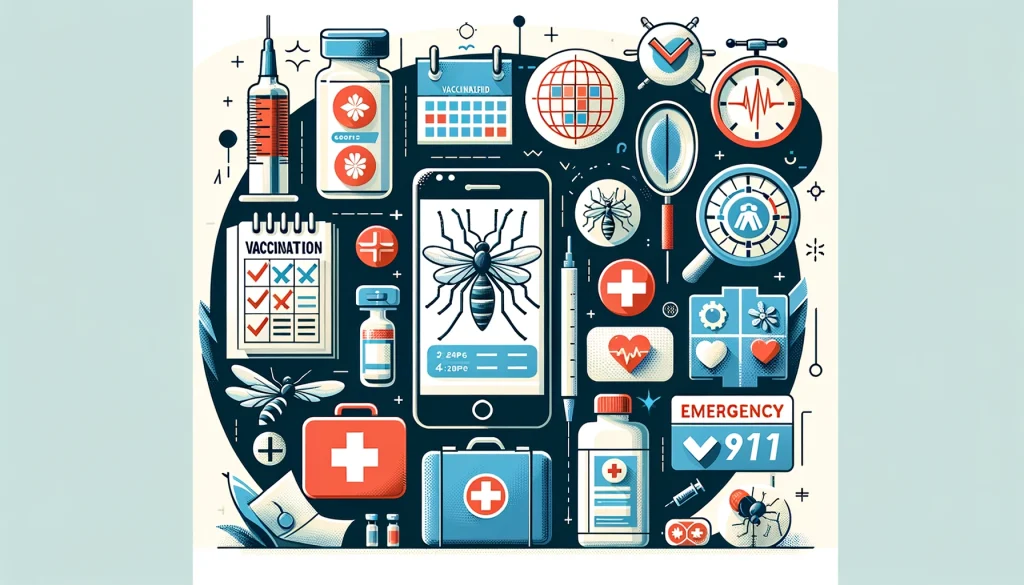Traveling to the Philippines promises an adventure through its enchanting islands, diverse cultures, and breathtaking landscapes.
However, ensuring a healthy and safe journey requires preparation, especially concerning vaccinations and health advice.
This extensive guide covers necessary vaccinations, the best time to visit, handling illness during your stay, and more, to help you plan a worry-free trip to the Philippines.
Necessary Vaccinations for Traveling to the Philippines
Before embarking on your journey, it’s crucial to consult with a travel health specialist or visit a travel clinic to discuss necessary vaccinations.
Common recommendations include:
- Routine Vaccines: Ensure you are up-to-date on routine vaccinations such as measles-mumps-rubella (MMR), diphtheria-tetanus-pertussis, varicella (chickenpox), polio, and your yearly flu shot.
- Hepatitis A and Typhoid: Recommended due to the risk of these diseases through contaminated food or water.
- Hepatitis B: Advised for those who might have blood or sexual contact with locals or if you anticipate needing medical treatment during your stay.
- Japanese Encephalitis: Consider this vaccine if your trip will include rural areas or extensive outdoor activities, especially during the rainy season.
- Rabies: Recommended for travelers involved in outdoor and other activities in remote areas that might bring them in direct contact with dogs, bats, and other mammals.
- Yellow Fever: Not required for the Philippines, but a certificate is necessary if you’re traveling from a country with a risk of yellow fever transmission.
Best Time to Travel to the Philippines
The Philippines has a tropical maritime climate, meaning it’s generally hot and humid year-round.
The best time to visit is during the dry season, from December to February, when temperatures are cooler, and the risk of typhoons is lower.
March to May marks the hot dry season, which can be uncomfortably hot for some travelers.
Handling Illness in the Philippines
If you fall ill while in the Philippines:
- Consult with a local doctor: For minor illnesses, pharmacies are widespread, and pharmacists can offer advice and over-the-counter medication. For more serious conditions, it’s advisable to see a doctor.
- Hospitals and Clinics: The Philippines has many high-quality hospitals, especially in larger cities like Manila and Cebu. Make sure you have comprehensive travel health insurance that covers medical treatment abroad and evacuation if necessary.
- Emergency Numbers: Dial 911 for emergency services. Keep the contact information for your country’s embassy or consulate handy in case of serious health issues.
When to Get Vaccinated
It’s best to consult with a healthcare provider 4-6 weeks before your travel.
Some vaccines require multiple shots spaced over weeks, and others may take time to become effective.
Recent Outbreaks and Health Notices
The Philippines and Southeast Asia can experience outbreaks of diseases like dengue fever, Zika virus, and chikungunya, primarily transmitted by mosquitoes.
Malaria is present in certain rural areas, though not typically a risk in major cities or tourist destinations.
Stay updated with travel advisories from health organizations like the World Health Organization (WHO) or the Centers for Disease Control and Prevention (CDC) closer to your travel dates.
Precautions and Preparation
- Mosquito-Borne Diseases: Use insect repellent, wear long-sleeved shirts and long pants, and sleep under mosquito netting if necessary.
- Food and Water Safety: Eat only well-cooked food, drink bottled or filtered water, and avoid ice cubes or raw produce.
- Sun Exposure: Protect yourself from the sun with hats, sunglasses, and sunscreen, especially when near water or at higher altitudes.
Frequently Asked Questions on Vaccinations for Travel to the Philippines
What vaccinations do I need for the Philippines?
The recommended vaccinations for the Philippines typically include Hepatitis A, Hepatitis B, Typhoid, Japanese Encephalitis (if you’re planning to visit rural areas or staying for a long time), and Rabies (for those who may be at risk due to their activities or prolonged stay). It’s also important to be up-to-date on routine vaccinations such as MMR, Diphtheria-Tetanus-Pertussis, Varicella, Polio, and your yearly flu shot.
Do I need a Yellow Fever vaccine to enter the Philippines?
Yellow Fever vaccination is required for travelers coming from countries with a risk of Yellow Fever transmission. It’s not needed if you’re traveling directly from a country where Yellow Fever is not a risk.
When should I get vaccinated before traveling to the Philippines?
Ideally, you should consult with a travel health specialist 4 to 6 weeks before your trip. Some vaccines require multiple doses spaced out over time, and others need a couple of weeks to take effect.
Is Japanese Encephalitis a common concern in the Philippines?
Japanese Encephalitis is present in the Philippines, particularly in rural farming areas and is more common during the rainy season. Travelers staying for extended periods or visiting rural areas should consider getting vaccinated.
Can I get vaccinated in the Philippines if I didn’t before my trip?
Yes, vaccinations are available in the Philippines, but it’s best to get vaccinated before your trip to ensure your immunity is built up before you arrive.
What should I do if there’s an outbreak of a disease in the Philippines?
Stay informed through the World Health Organization (WHO) and the Centers for Disease Control and Prevention (CDC) for any outbreaks or health notices. Follow local health advice and take precautions to protect yourself, such as using mosquito repellents and practicing good hygiene.
Are there any vaccines required for children traveling to the Philippines?
Children should be up-to-date on their routine vaccinations. Additional vaccines like Japanese Encephalitis may be recommended depending on the length and nature of the trip. Consult a healthcare provider for personalized advice.
How can I avoid mosquito-borne diseases in the Philippines?
Use insect repellent, wear long-sleeved shirts and pants, and sleep under mosquito nets or in rooms with screens or air conditioning. Avoid areas with standing water where mosquitoes breed.
Is tap water safe to drink in the Philippines?
It’s advisable to drink bottled or filtered water in the Philippines. Avoid ice in drinks and use bottled water even for brushing your teeth to avoid waterborne illnesses.
What health precautions should I take for food in the Philippines?
Eat only well-cooked food, avoid raw vegetables and fruits that you can’t peel, and consume dairy products from reputable sources to avoid foodborne illnesses.
Understanding the health risks and taking appropriate precautions, including getting the necessary vaccinations, can help ensure a safe and enjoyable trip to the Philippines.
Traveling to the Philippines requires careful health preparation, including necessary vaccinations and awareness of local health risks.
By taking the right precautions and staying informed about recent outbreaks, you can ensure a safe and healthy trip to this beautiful archipelago.



